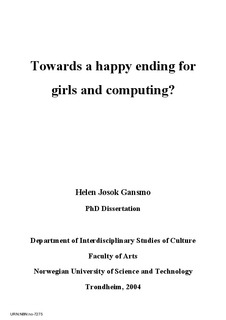Towards a happy ending for girls and computing?
Doctoral thesis
Permanent lenke
http://hdl.handle.net/11250/244091Utgivelsesdato
2004Metadata
Vis full innførselSamlinger
Sammendrag
Once upon a time in the promised land of Information Society there was a widespread concern for the dreaded Digital Divide.
In the wide range of modern stories and "fairytales" in our technoromantic era, access to and knowledge about computers always seem to hold the key to a prosperous future, while deprivation of such access will doom you to the far side of the Digital Divide. ICT (information and communication technology) thus seems to be the driving force of the 21st century as the electricity was for the 20th. As a result, the policymakers of Norway, even if, or just because, they rule a small country, are afraid of falling behind on the golden route to the future, and thus aspire to be on the right side of the digital divide. This is in accordance with general concerns in other countries and the EU about lagging behind, since they have observed that Japan and USA have been leading the way enroute to the Information Society (Selwyn 2002, Servaes and Heinderyckx 2002).
This is also a double drama because as in the traditional fairytales, princesses are in special danger or have wandered off and must be rescued by the heroes:
…knowledge in technology must be shared by all groups in order to prevent new differences from developing in the presuppositions for participation. Dissemination must thus proceed so that it does not consolidate traditional gender divisions where girls are raised to believe that "women do not understand" natural science and technology.
Girls and computing has been a topic in the Norwegian public discourse since "once upon a time" around 25 years ago, and I will through this collection of articles investigate various stories about the girls and computing problem at different sites and look into how these stories relate to each other.
